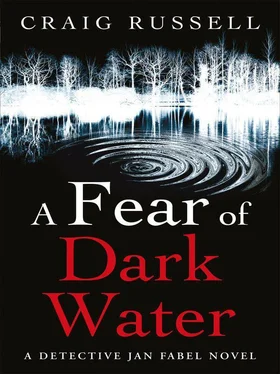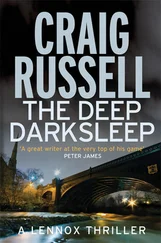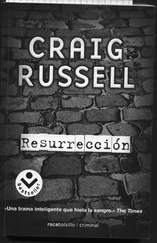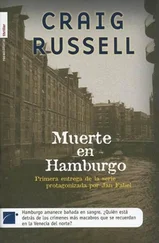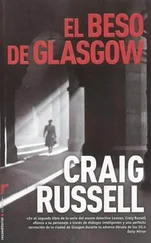Craig Russell - A fear of dark water
Здесь есть возможность читать онлайн «Craig Russell - A fear of dark water» весь текст электронной книги совершенно бесплатно (целиком полную версию без сокращений). В некоторых случаях можно слушать аудио, скачать через торрент в формате fb2 и присутствует краткое содержание. Жанр: Триллер, на английском языке. Описание произведения, (предисловие) а так же отзывы посетителей доступны на портале библиотеки ЛибКат.
- Название:A fear of dark water
- Автор:
- Жанр:
- Год:неизвестен
- ISBN:нет данных
- Рейтинг книги:5 / 5. Голосов: 1
-
Избранное:Добавить в избранное
- Отзывы:
-
Ваша оценка:
- 100
- 1
- 2
- 3
- 4
- 5
A fear of dark water: краткое содержание, описание и аннотация
Предлагаем к чтению аннотацию, описание, краткое содержание или предисловие (зависит от того, что написал сам автор книги «A fear of dark water»). Если вы не нашли необходимую информацию о книге — напишите в комментариях, мы постараемся отыскать её.
A fear of dark water — читать онлайн бесплатно полную книгу (весь текст) целиком
Ниже представлен текст книги, разбитый по страницам. Система сохранения места последней прочитанной страницы, позволяет с удобством читать онлайн бесплатно книгу «A fear of dark water», без необходимости каждый раз заново искать на чём Вы остановились. Поставьте закладку, и сможете в любой момент перейти на страницу, на которой закончили чтение.
Интервал:
Закладка:
Over the years Fabel had become accustomed to the shock and disbelief of others: how, in so many of these cases, people who knew the killer well had to adjust their perspective on everything; had to learn to view everyone with a new element of mistrust.
We all have a face we show to the world; and we all have a face that we only allow ourselves to see. It had been Uwe Hoffman, Fabel’s first boss at the Murder Commission, who had told him that. Maybe, thought Fabel, this Network Killer case wasn’t that different after all; maybe the internet was just a further extension of the way things had always been.
He ordered a salad and a mineral water and was watching the swans, thinking about nothing in particular, when his phone beeped again.
He read the text. It didn’t make much sense. It didn’t make any sense at all.
Chapter Nine
The house was on the boundary between the Schanzenviertel and St Pauli. It had its back to a railway line and had, at some distant point in its history, faced the world with some dignity. Now, however, that face was tattooed with a continuous, swirling band of graffiti, two metres high, and the ground-floor windows the graffiti half-framed were dark with soot and grime.
The young man who hesitated on the other side of the road, near the corner, carefully checking the street in both directions, was Niels Freese. He was checking for any hint of a police presence, uniformed or otherwise, before crossing over and knocking on the heavy door of the squat. The grimy glass of the window shadowed darker for a moment as someone inside checked out the approaching figure. They would, he knew, recognise him by his limp.
The door opened on his first knock and he slipped inside, into the dark cavern of the house. He instantly recognised the man who admitted him, a tall gangly male who was a little older than Niels, maybe thirty, and who had the kind of tough look that attracted police attention. But he did not know the man’s name. Then he realised that he had never met the man before, nor seen him. The thought flashed through Niels’s mind that the man at the door was actually also Niels, but in disguise, but he dismissed the thought by applying, as he had been taught to do by the doctors at Hamburg-Eilbek, reason and logic to an unreasonable and illogical perception. No, the man at the door was real and he was not another version of Niels. And the house was real, and not an exact replica in a carbon-copy of Hamburg created to beguile him.
He would not have known the man’s name, anyway: that was one of the rules, that you didn’t know the names of anyone outside your immediate cell. The fascists of the Polizei Hamburg or the BfV could not torture the information out of you if you did not have it to give. Niels nodded wordlessly to the man as he passed. Niels did not trust him, because Niels trusted almost no one older than himself: it had, after all, been they who had done what had been done to the world. And trust was something alien to Niels in any case. He might have got his delusions under some kind of control, but he still did not entirely trust the world he perceived around him.
Inside it was all gloom. Whereas the exterior had been run-down, the interior of the house was positively dilapidated. Large scabs of plaster had fallen from the walls and the floorboards were coated with plaster dust, grime and general filth.
A girl of about twenty, with lank blonde hair and bad skin, waited for him at the end of the hall, by the foot of the stairs.
‘He’s waiting for you.’ She tilted an acned chin up the stairwell. ‘Second door on the right. Go straight in. Were you followed?’
‘I wasn’t followed.’
‘Are you sure?’
‘I’m sure.’
The fact was that Niels did not only follow the protocols of the Guardians of Gaia regarding security, he had a routine that was ten times more elaborate than that which the Guardians demanded. He never explained his routines, because his need to defend himself against impostors sounded bizarre to others. The girl nodded and Niels made his way up the stairs. Despite having been told to go straight in, Niels knocked on the door before entering.
It had, at one time, been a bedroom. A pretty grand one. Now the windows had been boarded up from the inside, making the room a large, sealed box. But there was more light in here than anywhere else in the derelict house: artificial light from the desk lamps placed around the room. It did not have the clutter or detritus evident in the rest of the house: the floorboards had been swept clean of dust and cables taped to them; there were three workstations set against the wall to Niels’s right, each with a large computer monitor, and he could hear the distinct monotone hum of the five large hard-drives. The sight of the technology made Niels want to vomit. It represented everything that the Guardians of Gaia were fighting against, a complete negation of the organisation’s eco-anarcho-primitivism. But Niels knew, for he had been told by the Commander, that such technology, abhorrent as it was, was essential in carrying out the war against the forces of pollution and globalisation.
The theory did not help Niels with the reality: the irony was that, had it not been for the scruffy walls and boarded-over windows, this room could have been an office for any Hamburg business.
But it wasn’t. Straight ahead of Niels as he entered was a large desk at which sat the Commander, a heavyset man in his late thirties with a head of thick, curling black hair. To the Commander’s left, to Niels’s consternation, sat a couple dressed in grey business-type suits. Both the man and the woman looked as if they had walked out of a bank or insurance company and Niels noted that they shared the same expressionlessness.
‘Sit down, Freese,’ said the Commander.
‘Who are they?’ Niels nodded towards the couple.
‘Friends.’
‘Are they members of the Guardians?’
‘This is a war with many armies, Niels. Our friends here are allies. They fight for Gaia just like us, on the same side as us, but on a different battlefield. More than that need not concern you.’
Niels stared at the couple. They stared back, but without aggression; without anything in their expression. Why were they dressed like that? Niels did not like their suits in the same way that he did not like the computer hardware in the squat. For a start, where had it come from? Where had the money to pay for it come from? There again, he thought, it could be that the Commander had had it stolen to order. The idea cheered him a little.
‘The Globalist-Polluters are creating their own doom,’ continued the Commander. ‘ Our doom. Even their own scientists are talking about a Malthusian Cataclysm, about the Great Die-Off… so they are not blind to the catastrophe that they are shaping every day by chasing the Myth of Progress. They cannot say they don’t know the consequences of their actions.’
‘A Malthusian Cataclysm would not be a bad thing, Commander,’ said Niels, eagerly. ‘Humanity is a pestilence that needs to be controlled if Gaia is to survive.’
‘Mmm…’ said the Commander. ‘In the meantime we have to do all we can to wage this war. Our fight is the greatest battle in the history of mankind. While we sit here, Freese, our world, our ecosystem, is being raped. In the time it takes us to have this conversation, four million barrels of oil will have been pumped from the Earth. And all that carbon will just as quickly be pumped into the atmosphere.’ The Commander paused to allow Niels to process the information. He knew that you had to allow time for Niels to process information. He had noticed Niels’s limp again as the younger man had come into the room. He knew that the neurological damage behind the limp came from the same cause as Niels’s unique intellectual architecture. Oxygen deprivation at birth.
Читать дальшеИнтервал:
Закладка:
Похожие книги на «A fear of dark water»
Представляем Вашему вниманию похожие книги на «A fear of dark water» списком для выбора. Мы отобрали схожую по названию и смыслу литературу в надежде предоставить читателям больше вариантов отыскать новые, интересные, ещё непрочитанные произведения.
Обсуждение, отзывы о книге «A fear of dark water» и просто собственные мнения читателей. Оставьте ваши комментарии, напишите, что Вы думаете о произведении, его смысле или главных героях. Укажите что конкретно понравилось, а что нет, и почему Вы так считаете.
